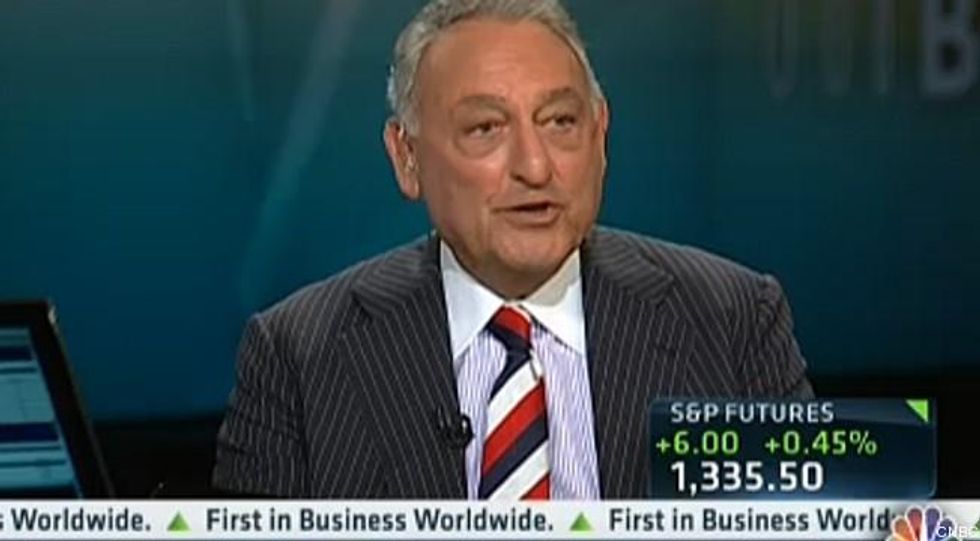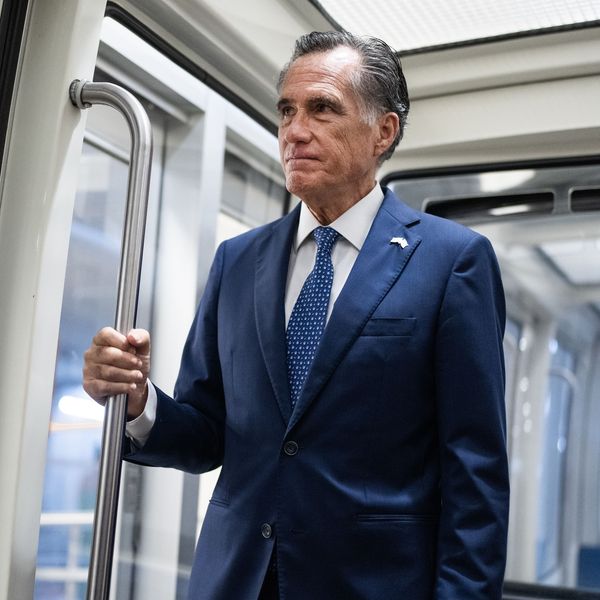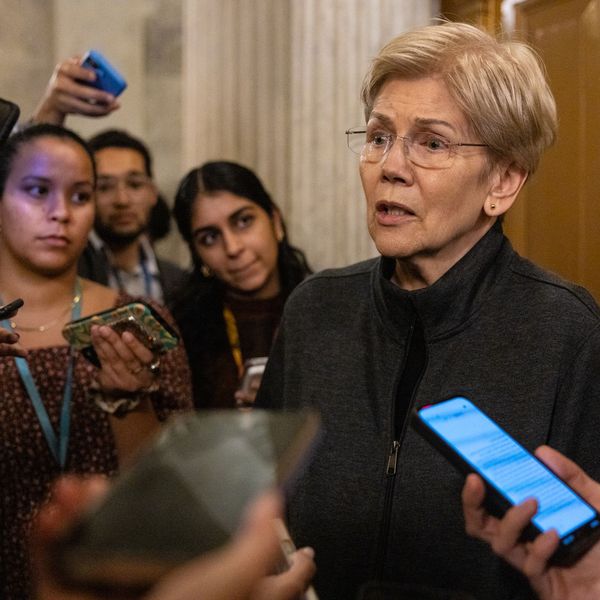The Man Who Invented "Too Big to Fail" Banks Finally Recants. Will Obama or Romney Follow?
I'm in Alaska, amid moose and bear, trying to steal some time away from the absurdities of American politics and economics. But even at this remote distance I caught wind of Sanford Weill's proposal on CNBC that big banks be broken up in order to shield taxpayers from the consequences of their losses. Forget the bear and moose for a moment. This is big game.
I'm in Alaska, amid moose and bear, trying to steal some time away from the absurdities of American politics and economics. But even at this remote distance I caught wind of Sanford Weill's proposal on CNBC that big banks be broken up in order to shield taxpayers from the consequences of their losses. Forget the bear and moose for a moment. This is big game.

If any single person is responsible for Wall Street banks becoming too big to fail it's Sandy Weill. In 1998 he created the financial powerhouse Citigroup by combining Traveler's Insurance and Citibank. To cash in on the combination, Weill then successfully lobbied the Clinton administration to repeal the Glass-Steagall Act - the Depression-era law that separated commercial from investment banking. And he hired my former colleague Bob Rubin, then Clinton's Secretary of the Treasury, to oversee his new empire.
Weill created the business model that Wall Street uses to this day -- unleashing traders to make big, risky bets with other peoples' money that deliver gigantic bonuses when they turn out well and cost taxpayers dearly when they don't. And Weill made a fortune - as did all the other executives and traders. JPMorgan and Bank of America soon followed Weill's example with their own mega-deals, and their bonus pools exploded as well.
Citigroup was bailed out in 2008, as was much of the rest of the Street, but that didn't alter the business model in any fundamental way. The Street neutered the Dodd-Frank act that was supposed to stop the gambling. JPMorgan, headed by one of Weill's proteges, Jamie Dimon, just lost $5.8 billion on some risky bets. Dimon continues to claim that giant banks like his can be managed so as to avoid any risk to taxpayers.
Sandy Weill has finally seen the light. It's a bit late in the day, but, hey, he's already cashed in. You and I and millions of others in the United States and elsewhere around the world are still paying the price.
What's the betting that one of the presidential candidates will take up Weill's proposal?
An Urgent Message From Our Co-Founder
Dear Common Dreams reader, The U.S. is on a fast track to authoritarianism like nothing I've ever seen. Meanwhile, corporate news outlets are utterly capitulating to Trump, twisting their coverage to avoid drawing his ire while lining up to stuff cash in his pockets. That's why I believe that Common Dreams is doing the best and most consequential reporting that we've ever done. Our small but mighty team is a progressive reporting powerhouse, covering the news every day that the corporate media never will. Our mission has always been simple: To inform. To inspire. And to ignite change for the common good. Now here's the key piece that I want all our readers to understand: None of this would be possible without your financial support. That's not just some fundraising cliche. It's the absolute and literal truth. We don't accept corporate advertising and never will. We don't have a paywall because we don't think people should be blocked from critical news based on their ability to pay. Everything we do is funded by the donations of readers like you. Will you donate now to help power the nonprofit, independent reporting of Common Dreams? Thank you for being a vital member of our community. Together, we can keep independent journalism alive when it’s needed most. - Craig Brown, Co-founder |
I'm in Alaska, amid moose and bear, trying to steal some time away from the absurdities of American politics and economics. But even at this remote distance I caught wind of Sanford Weill's proposal on CNBC that big banks be broken up in order to shield taxpayers from the consequences of their losses. Forget the bear and moose for a moment. This is big game.

If any single person is responsible for Wall Street banks becoming too big to fail it's Sandy Weill. In 1998 he created the financial powerhouse Citigroup by combining Traveler's Insurance and Citibank. To cash in on the combination, Weill then successfully lobbied the Clinton administration to repeal the Glass-Steagall Act - the Depression-era law that separated commercial from investment banking. And he hired my former colleague Bob Rubin, then Clinton's Secretary of the Treasury, to oversee his new empire.
Weill created the business model that Wall Street uses to this day -- unleashing traders to make big, risky bets with other peoples' money that deliver gigantic bonuses when they turn out well and cost taxpayers dearly when they don't. And Weill made a fortune - as did all the other executives and traders. JPMorgan and Bank of America soon followed Weill's example with their own mega-deals, and their bonus pools exploded as well.
Citigroup was bailed out in 2008, as was much of the rest of the Street, but that didn't alter the business model in any fundamental way. The Street neutered the Dodd-Frank act that was supposed to stop the gambling. JPMorgan, headed by one of Weill's proteges, Jamie Dimon, just lost $5.8 billion on some risky bets. Dimon continues to claim that giant banks like his can be managed so as to avoid any risk to taxpayers.
Sandy Weill has finally seen the light. It's a bit late in the day, but, hey, he's already cashed in. You and I and millions of others in the United States and elsewhere around the world are still paying the price.
What's the betting that one of the presidential candidates will take up Weill's proposal?
I'm in Alaska, amid moose and bear, trying to steal some time away from the absurdities of American politics and economics. But even at this remote distance I caught wind of Sanford Weill's proposal on CNBC that big banks be broken up in order to shield taxpayers from the consequences of their losses. Forget the bear and moose for a moment. This is big game.

If any single person is responsible for Wall Street banks becoming too big to fail it's Sandy Weill. In 1998 he created the financial powerhouse Citigroup by combining Traveler's Insurance and Citibank. To cash in on the combination, Weill then successfully lobbied the Clinton administration to repeal the Glass-Steagall Act - the Depression-era law that separated commercial from investment banking. And he hired my former colleague Bob Rubin, then Clinton's Secretary of the Treasury, to oversee his new empire.
Weill created the business model that Wall Street uses to this day -- unleashing traders to make big, risky bets with other peoples' money that deliver gigantic bonuses when they turn out well and cost taxpayers dearly when they don't. And Weill made a fortune - as did all the other executives and traders. JPMorgan and Bank of America soon followed Weill's example with their own mega-deals, and their bonus pools exploded as well.
Citigroup was bailed out in 2008, as was much of the rest of the Street, but that didn't alter the business model in any fundamental way. The Street neutered the Dodd-Frank act that was supposed to stop the gambling. JPMorgan, headed by one of Weill's proteges, Jamie Dimon, just lost $5.8 billion on some risky bets. Dimon continues to claim that giant banks like his can be managed so as to avoid any risk to taxpayers.
Sandy Weill has finally seen the light. It's a bit late in the day, but, hey, he's already cashed in. You and I and millions of others in the United States and elsewhere around the world are still paying the price.
What's the betting that one of the presidential candidates will take up Weill's proposal?

